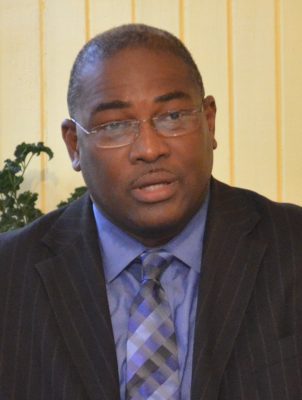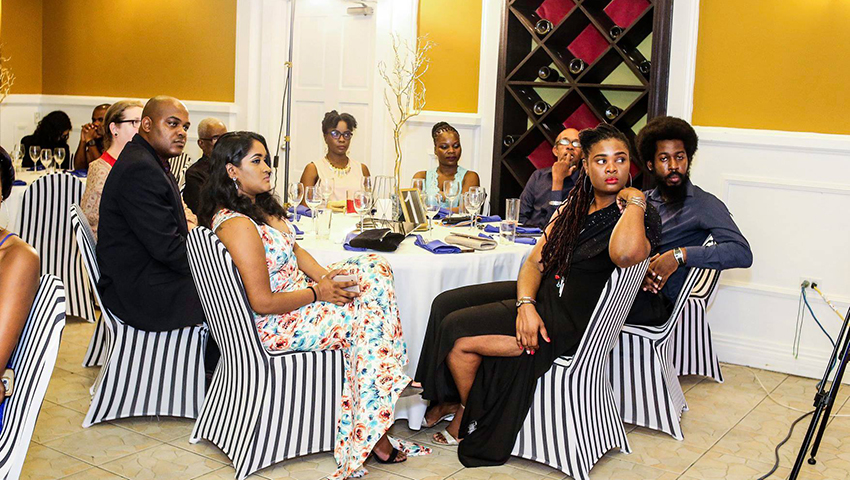Oil and Gas
A Presentation by Nigel Hughes, Attorney At Law on the occasion of the Guyana Press Association’s 2018 Media Awards ceremony
An edited version
Since the announcement of the discovery of oil and gas back in May 2015 much has been said on the subject.
Many of you have facilitated the dissemination of information, views and views beautifully dressed up as information to us, the largely unsuspecting public.
Oil is a completely new industry to our dear land and this has led to many announcements and even more pronouncements by several of us on the subject without the benefit of either experience of or real exposure to the industry.

In an attempt to limit the opportunity for misinterpretation or lack of clarity on my part in what I or may not say tonight, it is perhaps important that I premise my remarks by setting the context in which they are intended to be made. We live in a society in which there is mutual distrust between the main political actors. By and large our politics is not disconnected from the issue of race which mirrors this divide. There is an absence of any meaningful dialogue on the root causes of this divide and consequently an unwillingness or inability to address it and promote efforts at reconciliation.
Our constitutional architecture rewards the winner in our challenged society with most of the power and leaves those who have not won feeling vanquished and excluded. Our differences are as long as they are perhaps historic. We have had no golden era of great racial unity to refer to. Even though we all profess that our friends are multi-ethnic and multi-cultural.
Since 1815 when the three counties were first joined together there has been no era in which our race relations would satisfy the basic requirements of good. In a word, there were no good old days when race and politics met acceptable standards of an inclusionary society.
Throughout the period from the 1950s moving forward the media has played a varied role in the development of the country.
With the exception of rum and a few world class cricket players we have not produced anything which was globally competitive. Not sugar, not bauxite, not rice. Our extractive industries like gold and manganese have not been efficient when matched against world standards. Our history of the management of the larger projects, Skeldon Sugar Factory the Berbice Bridge and the MMA Scheme has been less than stellar. Our rankings on the corruption indices has been less than promising.
It is onto this structure and in these circumstances that we now pour the promise of untold wealth from oil and gas. A glorious opportunity for real transformational change and development and equally so, the perils of the downside are proportionate in their scope.
Outside of the shores of Guyana, there is a discernible buzz and excitement about Guyana in oil and gas circles and even beyond. We have been slow, very slow in paying attention to what is happening beyond our shores where plans are being made for and about us.
It is in the context of the former, the opportunity for transformational change and development that my observations on the role of the media are based.
One of your own captured the power of the media for change this way “ All of us who professionally use the mass media are the shapers of society. We can vulgarize that society. We can brutalize it. Or we can help lift it onto a higher level.” (William Bernbach)
Violence, conflict and death often populate the front pages and social media, creating the impression, perhaps unintentionally, that we are more interested in conflict that we are in solutions and resolution.
The experience for oil and gas in the media in Guyana has been no different. It commenced with the suppression of the terms of the Exploration Agreement followed by the suppression of the fact and terms of the Production Sharing Agreement from the public. The press were relentless in their justified pursuit of the publication of the terms of the PSA. These unfortunate events then shaped the discussion which followed.
Battle lines were drawn between those who painted themselves into the position of having to defend the terms of the contract and those who saw corruption, ineptitude, inexperience and mismanagement at every level. In the course of this ongoing shouting match little if any attention was paid to or is being paid to educating the public about oil and gas and perhaps more importantly providing references to independent data on which the public can arrive at its own conclusions.
Most depressing is the absence of any real debate especially between the political parties and academia about the vision for developing Guyana using the revenues from oil and gas. Beyond the rhetoric of infrastructural development and the repetition of the usual mantra of road to Brazil, fixed span bridges over our main rivers and roads links, no details have emerged about how each political entity plans to deploy the revenues from oil and gas for real transformational development.
There has been no discussion on where Guyana will be positioned for real sustained development. Will we engage Brazil on the strategic importance of Guyana for the development of the northern states of Brazil which are either land locked or disadvantaged by the length of time it takes to get goods up the Amazon? Will we discuss the option of a rail link between Manaus and a port on the coast of Guyana with quick access to the Panama for the industrial development of northern Brazil? Even closer in time, has any gap analysis been done on where our inadequacies lies in the provision of goods and services locally and how both the government and private sector can develop capacities in the short, medium and long term so that by dint of pure cost and competitiveness we ensure that most of the jobs in the industry come to Guyanese?
Local content which has frequently dominated the headlines is a contest of talking heads far removed from any analysis of or reference to verifiable data. It is difficult to have a discussion about local content without first finding out what content exists locally and what are the firm detailed plans that exist for providing content locally at the standards which are required in the industry.
The clashes between the government and those who oppose their every move make great headlines but if they are not checked against verifiable data, information and experience, we lose the entire population who get distracted by the nature of the headlines and the statements which are made rather than in the accuracy of what is said.
Recently in Buxton the eminent Professor Thomas advanced the idea of conditional cash transfers. He
commenced his address by saying that this was his last ditch effort to put the conditional cash transfers on the agenda.
The fact that someone of the stature and commitment to Guyana as Professor Thomas could not have otherwise got the idea up for discussion on the national agenda speaks volumes about what sort of society we have created and continue to develop.
What followed was even more disturbing. The President said and I quote the media here “I don’t know that there is a precedent for it. So, I don’t know the evidential basis for making such a proposal and it is not part of the proposal for the Sovereign Wealth Fund,”
Well I had hoped that as soon as the President made that announcement the media would have researched it and challenged the President on it.
Here is what was and is available on the most cursory research on the internet.
“Conditional Cash Transfer (CCT) programmess, started in the late 1990s in Latin America, have
become the anti-poverty program of choice in many developing countries in the region and elsewhere.
Their objectives, including short-term poverty reduction via transfers, and long-term poverty reduction through enhanced investment in human capital, have broad policy appeal. The most common designs for CCTs generally follow the original design of Progresa, the Mexican program begun in 1997. Targeted to the poor, the principal program components include regular cash transfers to women (conditional on scheduled visits to health care providers for young children and on school enrollment and regular school attendance for school-age children) and social marketing to encourage investment in nutrition, health and education.”
I am still to see the article which says Mr. President there is enough data since the 1990s on Conditional Cash transfers from which we can study the results and make an assessment about their viability in Guyana then provide the data on this for the benefit of the population. Instead we have become involved in the argument/ discussion about whether we should get cash handouts from the oil revenues without locating such a discussion in the context of poverty alleviation.
Not entirely unexpectedly the population now has formed the view that we will be collecting cheques annually from the state.
Last week while walking to court after the misleading headline which said that I was opposed to conditional cash handouts when my response was let us see the data, a taxi driver shouted to me from his car “ Nigel let we get we oil money from the Government yeah”. No doubt the impression was created that the government could pay everybody a cheque and I was opposed to the idea.
You possess the power to anticipate and head off political disputes which in Guyana quite often means ethnic /racial contretemps. For example start the discussion on the issues of what are the critical requirements for the location of shore basis before some politician drags it into a sphere of ethnic discourse about whether the chosen location is to satisfy some particular set of voters.
You are the most critical element in framing the discussion on the development of this industry and more importantly the future of Guyana. Nothing else comes close; Not the politicians, the bureaucrats, not the self – appointed experts and certainly not the Lawyers.
I have no doubt that all the members of the media are patriotic, very patriotic. You possess the unrivalled power to shape the development of your country. Use it for this purpose rather than lend support to talking heads which are sometimes focused on making political points, spreading gloom and doom without presenting alternative solutions and approaches.
In this era we constantly doubt our own abilities to create a new and different Guyana. We have had the longest sustained growth in the region through two different administrations. Yet we appear to have resigned our self to failure at a time of great promise. After fifty years of independence we are wise enough once we have reliable, independent, verifiable information to determine what makes sense and what doesn’t.
We are all collectively capable of transforming this good country of ours into a truly modern democratic, post – colonial fully developed country in which justice, equal opportunity, economic and social mobility, strong independent institutions and enhanced human rights are guaranteed to all.
You have the power to set the agenda. Use it wisely and for the benefit of Guyana.






